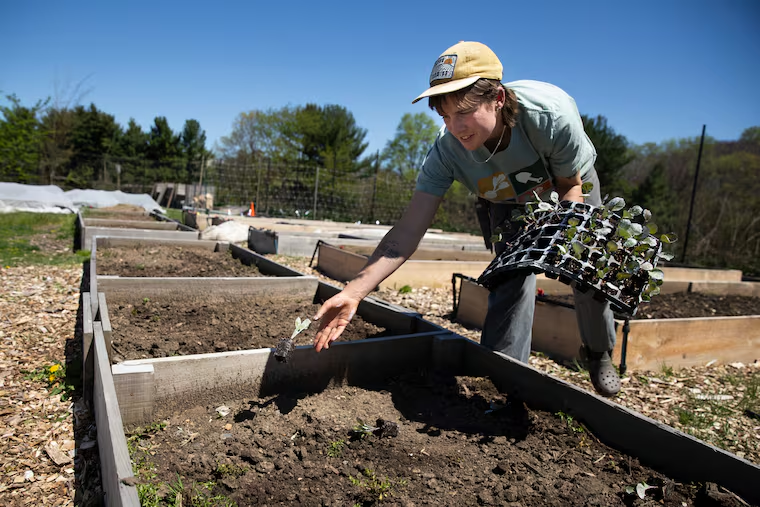Lankenau Medical Center is combatting food insecurity with an on-campus farm
Deaver Wellness Farm supplies about 4,000 pounds of fresh produce per year to Lankenau Medical Center patients who can't reliably access fresh foods.

In a lush patch of land next to the emergency helipad at Lankenau Medical Center, the first raspberries of the season are about to sprout. Nearby, netting protects tiny shoots of kale from bugs, and an irrigation system is slowly watering a crop of carrots.
This half-acre Delema G. Deaver Wellness Farm supplies about 4,000 pounds of fresh produce per year to patients experiencing food insecurity at Lankenau, which sits at the intersection of West Philadelphia and Montgomery and Delaware Counties. This summer’s growing season will mark its eighth year in operation.
Every two weeks, from July through November, the farm provides a selection of six crops — tomatoes, kale, radishes, carrots, and other seasonal produce — to 40 families at a Lankenau primary care clinic serving mostly uninsured and underinsured patients. Eligible patients are selected by a screening tool at the clinic that determines whether they can reliably access healthy foods.
About 48% of the clinic’s 600-plus patients experience food insecurity, said Maureen Krouse, Lankenau’s community health and equity manager. Because the farm is not large enough to feed all of them, the clinic connects interested patients who can’t receive produce boxes with other programs that supply fresh food around the city.
Lankenau’s health equity staff has been working to increase patients’ access to fresh food for nearly two decades, launching an education center in 1995 to teach children about healthy eating.
“The thinking is that the more children could learn about healthy eating, as they become adults, they can implement that into their lifestyle,” Krouse said.
Around 2014, leaders at the Main Line Health hospital floated the idea of supplying that healthy food themselves. They sowed their first seeds on the Deaver Farm, named after a longtime Lankenau donor and volunteer, in April 2016, working with Greener Partners, a food education nonprofit.
» READ MORE: Lankenau is offering rides and veggie deliveries to help some patients access needed care before a heart surgery
A recipe for health
Patients who get produce boxes also receive a set of recipes featuring the contents of the box — all low-sodium, low-sugar, low-fat recipes that also use pantry staples that most people are likely to already have in their house.
The most gratifying success stories, Krouse said, come from patients who report they’ve improved their health, such as by lowering their blood pressure, after receiving a season of produce boxes.
Farm manager Shan Wichmann, who works for Greener Partners, values the opportunity to provide fresh food for clinic participants and to educate physicians and patients across Lankenau.
The farm runs a number of educational sessions throughout the growing season, including two-week sessions where doctors learn from Wichmann about food insecurity.
On a recent weekday, Wichmann was preparing pots of kale and basil for patients to take home at the end of an upcoming class.
For patients who can’t afford to regularly buy fresh fruits and vegetables, it’s often cheaper to purchase processed foods or canned goods; providing them with opportunities to grow their own food helps patients connect more with what they’re eating, they said.
“Food is what connects all of us — and it’s really important for people, especially if they have food insecurity, to be reconnected with their food and be reconnected with the land, too,” Wichmann said. “I think it’s just a very beautiful way to be able to build community.”